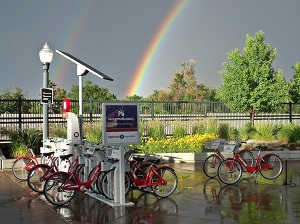Colorado company using off-grid PV for bike-share kiosks
 While much has been made of solar panels powering buildings, most people haven’t given as much thought to what powers the kiosks that dispense our skiing tickets and help us check in at airports. At least one company, KIOSK, based out of Louisville, Colo., has begun adding energy-efficient features such as low-power cooling fans and off-grid solar panels to certain kiosk units in an effort to save both money and energy.
While much has been made of solar panels powering buildings, most people haven’t given as much thought to what powers the kiosks that dispense our skiing tickets and help us check in at airports. At least one company, KIOSK, based out of Louisville, Colo., has begun adding energy-efficient features such as low-power cooling fans and off-grid solar panels to certain kiosk units in an effort to save both money and energy.
Denver, Colo., residents have probably seen the “B-Cycle” bike-share kiosks prevalent on the 16th Street Mall.
According to Cheryl Madeson, marketing manager for KIOSK, these are the first outdoor units to be entirely powered by solar energy, but that there is “enormous potential” for other types all-solar kiosks to become more popular, such as those that issue parking passes.
Since a kiosk with a seven-year lifespan can be expected to consume over 5000 kilowatt-hours of electricity, the energy savings in taking one kiosk off of non-renewable sources can be quite substantial.
Using energy-friendly fans instead of traditional air-conditioning to cool the computer equipment inside kiosks can also allow for energy savings, even when a unit may not be optimally placed for solar power, Madeson said.
Automated kiosks have gained popularity in most major cities, but there is a disparity in how many communities choose to power these labor-savers. Since solar panels have yet to gain popularity among all communities, it generally falls to more eco-conscious cities to lead the way with this technology, and create a buzz that will interest customers elsewhere.
Madeson points out that the initial success of the B-Cycle units have already led to more interest in energy efficiency among potential clients. Automated recycling kiosks, under the Greenopolis banner, are expected to further increase interest and spread awareness of the potential of outdoor solar power.
The concept of off-grid solar power for outdoor use could lead to a spread of this technology beyond kiosks.
Both businesses and local governments could save energy by using similar concepts for outdoor lighting and digital signs, for example.
Madeson has mentioned that other energy-efficient modifications for kiosks are in the works as well, so that the rise of automated stands could soon universally represent not only a financially sensible choice for clients, but an ecologically friendly one as well.
Pictured: There are a few metaphors at work in this photo. We're just not sure which ones we can joke about. Image courtesy of Denver Bike Share.



